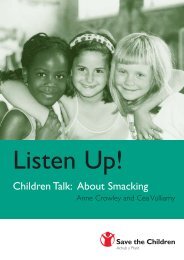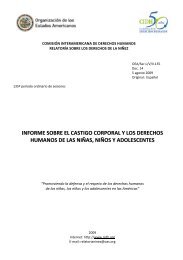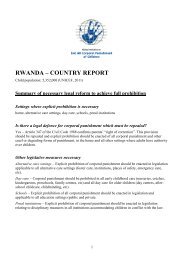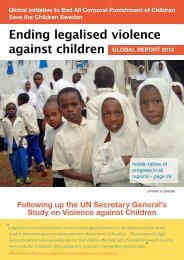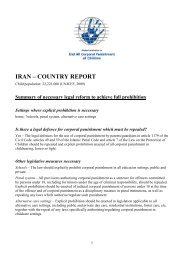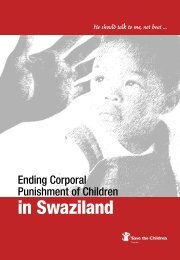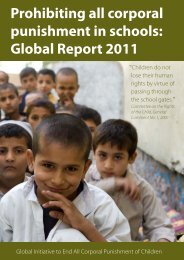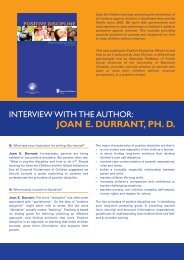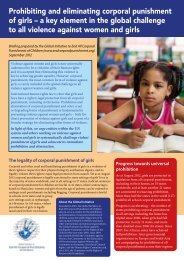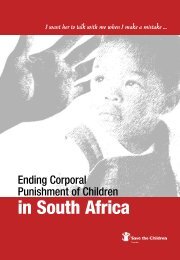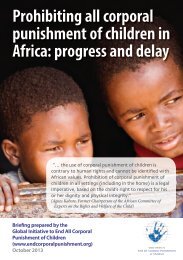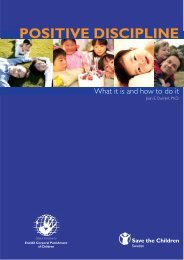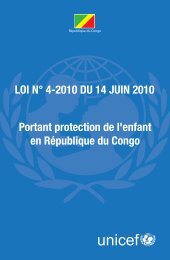Prohibiting corporal punishment of children in the Caribbean ...
Prohibiting corporal punishment of children in the Caribbean ...
Prohibiting corporal punishment of children in the Caribbean ...
Create successful ePaper yourself
Turn your PDF publications into a flip-book with our unique Google optimized e-Paper software.
MessagesJean ZermattenI am always surprised to hear parents, politicians, <strong>the</strong> media, education specialists and government<strong>of</strong>ficials assert that violence aga<strong>in</strong>st <strong>children</strong> constitutes a scourge that must be fought withdeterm<strong>in</strong>ation – while at <strong>the</strong> same time <strong>the</strong> same people justify <strong>corporal</strong> <strong>punishment</strong>, us<strong>in</strong>gversions <strong>of</strong> <strong>the</strong>se arguments that have long been well-known:“A slap every once <strong>in</strong> a while never hurt anyone.”“My parents used it and see how well I turned out.”“The right to correction is a natural right.”“Physical <strong>punishment</strong> is ‘tough love’.”Chair, UN Committee on <strong>the</strong>“How can I impose discipl<strong>in</strong>e if I can’t even spank my child?”Rights <strong>of</strong> <strong>the</strong> Child… As if to <strong>in</strong>dicate that this practice, be<strong>in</strong>g socially accepted must <strong>the</strong>refore be good!But <strong>the</strong> consensus among specialised circles is clear: physical <strong>punishment</strong> is “<strong>in</strong>effective from a pedagogical stance,questionable from a moral stance, and bear<strong>in</strong>g serious consequences from a medical and psychological stance” (Balestra, C.(2008), L’<strong>in</strong>terdiction légale des châtiments corporels au se<strong>in</strong> de la famille / The legal <strong>in</strong>terdiction <strong>of</strong> <strong>corporal</strong> <strong>punishment</strong> <strong>in</strong> <strong>the</strong> family,IDE, Bramois, 44-55).A change <strong>of</strong> m<strong>in</strong>dset seems necessary to me so that all citizens, act<strong>in</strong>g <strong>in</strong> all contexts, become aware <strong>of</strong> <strong>the</strong> negative effect<strong>of</strong> <strong>corporal</strong> <strong>punishment</strong> and o<strong>the</strong>r cruel and degrad<strong>in</strong>g forms <strong>of</strong> <strong>punishment</strong> on <strong>the</strong> development <strong>of</strong> <strong>the</strong> child. To achieve this,a clear decision on behalf <strong>of</strong> <strong>the</strong> legislative power, follow<strong>in</strong>g <strong>the</strong> example <strong>of</strong> Sweden, <strong>the</strong> first country to <strong>in</strong>troduce an explicitlegal ban <strong>in</strong> 1979, is <strong>the</strong> first step towards <strong>the</strong> realisation <strong>of</strong> <strong>the</strong> values which found this new norm.We must be coherent: we cannot hit <strong>children</strong> with one hand whilst preach<strong>in</strong>g <strong>the</strong> eradication <strong>of</strong> violence aga<strong>in</strong>st <strong>children</strong>. Itis a question <strong>of</strong> common sense. In addition, I refer myself to many <strong>in</strong>ternational recommendations <strong>in</strong> <strong>the</strong> field, <strong>in</strong> particular tothose <strong>of</strong> <strong>the</strong> Committee on <strong>the</strong> Rights <strong>of</strong> <strong>the</strong> Child <strong>in</strong> its General Comment No. 8 on “The right <strong>of</strong> <strong>the</strong> child to protection from<strong>corporal</strong> <strong>punishment</strong> and o<strong>the</strong>r cruel or degrad<strong>in</strong>g forms <strong>of</strong> <strong>punishment</strong>” (CRC/C/GC/8, 2006) and to those <strong>in</strong> <strong>the</strong> report <strong>of</strong> <strong>the</strong><strong>in</strong>dependent expert for <strong>the</strong> United Nations Secretary General’s Study on Violence aga<strong>in</strong>st Children (A/61/299, 2006).I <strong>in</strong>vite all adults to become aware <strong>of</strong> <strong>the</strong> detrimental effects <strong>of</strong> this violence towards <strong>children</strong> and to adopt positiveeducational attitudes. I urge governments to explicitly prohibit all <strong>corporal</strong> <strong>punishment</strong>, <strong>in</strong> all contexts, <strong>in</strong>clud<strong>in</strong>g <strong>in</strong> <strong>the</strong>family.The dignity <strong>of</strong> <strong>the</strong> child and <strong>the</strong> <strong>in</strong>tegrity <strong>of</strong> <strong>the</strong> educational process are at stake.I have <strong>of</strong>ten heard people suggest<strong>in</strong>g that <strong>the</strong> efforts to end <strong>corporal</strong> <strong>punishment</strong> and o<strong>the</strong>rforms <strong>of</strong> humiliat<strong>in</strong>g <strong>punishment</strong> are a m<strong>in</strong>or matter. I must emphasise that this is not so; it is <strong>of</strong>fundamental importance not only for <strong>children</strong> but for societies’ development that <strong>the</strong> authoritiesact to prohibit and elim<strong>in</strong>ate it <strong>in</strong> an appropriate and decisive manner. All violent <strong>punishment</strong> mustbe prohibited because it violates <strong>children</strong>’s rights to personal <strong>in</strong>tegrity and human dignity, to beprotected from all forms <strong>of</strong> violence.These rights are recognised <strong>in</strong> <strong>the</strong> UN Convention on Rights <strong>of</strong> <strong>the</strong> Child and o<strong>the</strong>r <strong>in</strong>ternationalhuman rights treaties. The UN Committee on <strong>the</strong> Rights <strong>of</strong> <strong>the</strong> Child and <strong>the</strong> Inter-AmericanRosa María Ortiz Commission and Court on Human Rights have clearly <strong>in</strong>terpreted states’ obligations. In ratify<strong>in</strong>ghuman rights <strong>in</strong>struments, states commit to take all necessary measures to ensure <strong>the</strong> humanRapporteur on <strong>the</strong> Rightsrights <strong>of</strong> all people, without any k<strong>in</strong>d <strong>of</strong> discrim<strong>in</strong>ation.<strong>of</strong> <strong>the</strong> Child, Inter-AmericanCommission on Human Rights Nowadays, <strong>the</strong>re is a better understand<strong>in</strong>g <strong>of</strong> <strong>the</strong> harmful physical and psychological effects on<strong>children</strong> <strong>of</strong> violent <strong>punishment</strong>. Our societies and legal systems do not tolerate violence as a way <strong>of</strong>personal <strong>in</strong>teraction or conflict resolution among adults. Children are not second-class citizens; on <strong>the</strong> contrary, <strong>the</strong>y deservespecial protection from <strong>the</strong>ir family, society and <strong>the</strong> state. States must send a clear message by urgently prohibit<strong>in</strong>g all forms<strong>of</strong> violence aga<strong>in</strong>st <strong>children</strong>, <strong>in</strong>clud<strong>in</strong>g violence disguised as discipl<strong>in</strong>e. States must also support parents and o<strong>the</strong>rs <strong>in</strong> directcontact with <strong>children</strong> <strong>in</strong> rais<strong>in</strong>g <strong>the</strong>m without violence, us<strong>in</strong>g positive discipl<strong>in</strong>e that respects <strong>children</strong>’s rights.2 <strong>Prohibit<strong>in</strong>g</strong> <strong>corporal</strong> <strong>punishment</strong> <strong>of</strong> <strong>children</strong> <strong>in</strong> <strong>the</strong> <strong>Caribbean</strong>:



